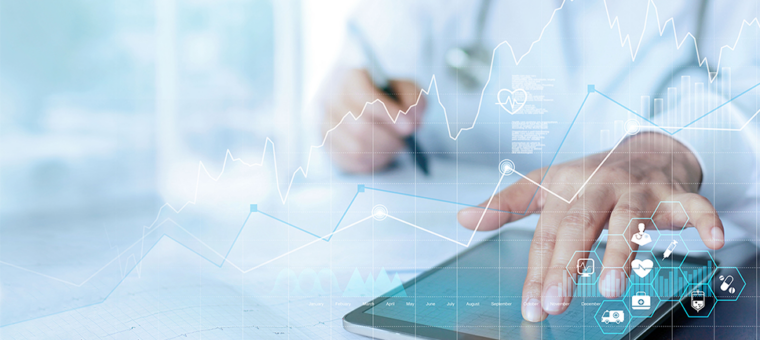Transforming Healthcare with Data

Learn how business analytics is driving change across the healthcare industry—and what that means for healthcare systems, providers, and patients.
Having the best information for decision-making in business is always optimum, yet in no industry is data-driven decision making more critical than in healthcare, where the decisions can literally be a matter of life and death. This is where business analytics can be most valuable—especially in a post-covid landscape—in driving healthcare’s transformation.
Business analytics (also referred to as business intelligence) encompasses the general applications, platforms, tools, and best practices that facilitate data access and analysis to enhance decision-making and performance. In healthcare, analytics provide value at every level, from the industry as a whole to individual systems and providers and down to the essence of it all: the patient and their care experience.
We’ll explore the current state of healthcare, how business analytics is helping to transform it, and reveal the tremendous value of leveraging business intelligence in healthcare.
Making Sense of the Healthcare Landscape
There’s no industry more complex and fraught with challenges than healthcare—especially in the U.S. market. To understand where analytics can take healthcare, it’s important to grasp where the industry is already headed. There have been recent, monumental shifts at many levels—the biggest being the Affordable Care Act, which set in motion a shift from healthcare’s traditional fee-for-service (FFS) payment model to a value-based care approach.
A value-based care model is designed to incentivize healthcare providers with payments based not on the consumption of care but on the quality of care they offer Medicare patients. And achieving these incentives requires measurement via business analytics. The healthcare industry generates massive amounts of data that require technology platforms and analytics expertise to be able to access it and put it to work.
An Endless Array of Applications
The speed and accuracy analytics provide the key to their application across every level of the healthcare industry. For example, machine learning algorithms can analyze more data, faster. This has obvious advantages for healthcare in areas such as medical research, but that’s just the start. Analytics can help detect patterns in illnesses and predict outbreaks of diseases like the flu or even the next pandemic.
At the hospital or health system level, analytics enable the measurement of virtually every process and the streamlining of every service. Data analytics can be applied to:
- Scheduling and staffing: Analytics can be used to help systems estimate demand for services and enable them to meet that demand more efficiently through optimal staffing.
- Supply chain management: Supply chain issues can have negative ripple effects across a healthcare system, but applying analytics to supply chain metrics can help avert bottlenecks, improve overall efficiency and lead to cost savings for hospitals of up to $10 million per year.
- Performance measurement: Measurement is key to performance improvement, and analytics enable the implementation of metrics known as key performance indicators (KPIs) that tell health systems how they are performing in the areas they choose to measure, from an average length of stay and occupancy and readmission rates to wait times, care costs and patient satisfaction.
- Electronic health records: Electronic health records (EHRs) are the most common application of analytics in healthcare delivery. They’ve brought patient medical records online (and thus more easily accessible for providers and patients), and they can deliver alerts when screenings or prescription refills are needed—and data analytics help make it all possible.
- Care delivery: Beyond EHRs, analytics can help streamline care delivery (and improve patient safety) via Clinical Decision Support (CDS) tools, which can offer providers on-the-spot reminders and patient-specific alerts that enhance care decision-making.
The Present (and Future) Value of Healthcare Analytics
Business analytics is creating value across the healthcare continuum, reducing costs and enhancing efficiencies in multiple applications and sectors. In the process, it’s also developing a more personalized approach to patient care via predictive analytics that can touch every aspect of care from avoiding medication interactions to tracking and enhancing individual wellness and improving outcomes.
As healthcare continues to transform, analytics is poised to play an even greater role in its future. For example, growth sectors like telehealth, which experienced a 33% increase in visits and a 75% consumer satisfaction rating amid the pandemic, rely heavily on artificial intelligence and predictive analytics for patient diagnosis and monitoring and personalized treatment plans.
Data analytics is already playing a role on an even broader scale via its application in population health management. Population health, as broadly defined by George Washington University, is “an opportunity for health care systems, agencies and organizations to work together in order to improve the health outcomes of the communities they serve.” It’s a growing area of healthcare that goes hand in hand with the value-based care model and allows for collaboration across health systems and plans to enable an even greater impact.
Data analytics is driving decision-making and redefining business, and the healthcare industry is poised to capitalize on the insights it can provide as well.
Ready to learn how to harness the power of analytics for your healthcare organization? Visit the program page here.


